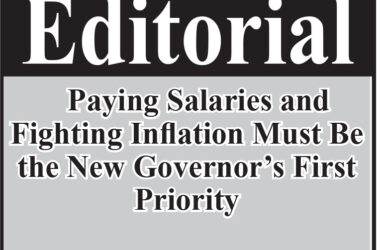This morning, on our way to work, my wife was scrolling through her phone when she paused and read out loud a post from the Ministry of Finance.
It was an official announcement: April salaries are being processed for all civil servants, organized forces, the army, and diplomatic missions abroad.
The statement released by the Ministry confirmed that the processing and payment of salaries for April 2025 has officially begun. However, this indicates that the 24th of the month is now being treated as the salary processing date, not the actual payment date.
There is a need for the Economic Cluster or the Ministry of Finance to clearly communicate the exact date when salaries will be disbursed. This will help manage expectations and prevent civil servants from assuming that the 24th is the fixed payday each month.
Both of us left home together, heading to Konyo-Konyo—me to catch my usual ride, and her to look for pharmacy supplies. Once we arrived, we went our separate ways after wishing me a blissful day. I headed straight to the bus park.
The bus filled up in no time like it always does with early risers racing the sun to wherever life was dragging them that day. I grabbed a window seat in the second-to-last row, next to a woman who looked like she could’ve been my mother’s age or her peer at least. Can’t say for sure, but the sense was there.
Across from us sat a young man who looked like he borrowed my face, a middle-aged man with that “I’ve-seen-it-all” expression, and a woman in her late 30s who seemed like the unspoken leader of the trio. Judging by the ease of their greetings and the casual elbow nudges, it was clear they knew each other or were really good at fantasizing.
Their quiet murmurs quickly bloomed into a lively conversation, and as the writer behind the Listening Ear column, you better believe I perked up. My ears sharpened, my mind tuned in, because where there’s banter, there’s always a story.
They were talking about work. Not the pride of it, but the pain of it. Unpaid effort. Assignments completed under pressure. Promises made, but salaries delayed.
One of them, the woman, shared her story. She used to work at one of the universities in Juba, but she gave up. Not because she couldn’t do the job, but because the job couldn’t support her life. She now runs a small shop in front of her house. “Some days I make 30,000… some days 40,000 SSP,” she said, with a shrug and a smile. “But at least, I can pay school fees. I can buy medicine. I sleep better.”
Everyone nodded. That kind of nod — the one that says, I understand that pain.
She spoke of how delayed salaries break more than bank accounts. They break homes. They create tension. “Imagine a man going to work every day… coming back with nothing to show at the end of the month,” she said. “What kind of dignity is left in that?”
Her words stuck with them: One asked, even if they pay us one month now, what do we do with it? Pay debts? It’s already gone before we even touch it.
That’s the reality of South Sudan’s civil servants. They work hard. They endure pressure. But when the time comes to be appreciated and to be paid, they are met with silence or delay.
So, this piece is not just about that post from the Ministry. It’s about the people I ride the bus with. The people who clean our streets, teach our children, file our paperwork, secure our country, represent us abroad, and go to bed wondering how to make it through the next day.
To the government: Your workforce is your engine. Treat them like they matter. Respect their labor. Pay them on time, not as a favor, but as a right.
And to the South Sudan Workers’ Union: please wake up. You’ve been quiet too long. We need a union that speaks up, shows up, and stands up for workers. As a fellow trade unionist, I know the power you hold when you choose to use your voice.
To all civil servants in this country: Your stories matter. Keep telling them. You deserve better.




